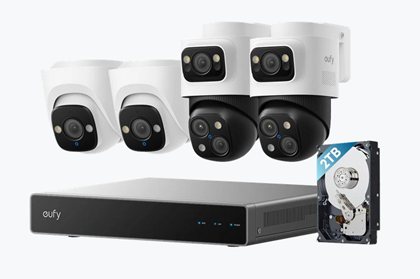Choosing Security Camera Resolution: 1080p, 4K, & Beyond
- 946
- 98
Choosing Security Camera Resolution: 1080p, 4K, & Beyond
- By huawei-accessories.com
- 10/10/2025
Choosing the correct resolution for a security camera has a direct impact on how well it captures details such as faces, license plates, and odd activities. Many customers ask if 1080p still works well, or if upgrading to 4K and beyond is worthwhile. Resolution influences storage, internet bandwidth, and camera price, so understanding the variations may help you purchase intelligently. This tutorial explains how resolution works, compares 1080p and 4K cameras, and investigates whether greater resolutions provide significant benefits. By the end, you'll know which solution best suits your home, office, or business security requirements without overpaying for unnecessary features.

What Does Security Camera Resolution Mean?
Resolution and Image Quality
Resolution is the number of pixels that comprise a picture. A higher resolution indicates more pixels, which results in crisper and clearer video. For example, 1080p cameras record 1920x1080 pixels, but 4K cameras produce 3840x2160 pixels. When you zoom in on the clip, the difference becomes evident. A 1080p image may blur when expanded, but a 4K image keeps more detail. This clarity is important when attempting to detect small items or identify persons. However, increased resolution necessitates more storage and more powerful internet connections. Understanding this trade-off allows you to balance image quality with cost and technological needs.
Common Resolution Options
Security cameras come in a variety of resolution options. The most often used resolutions are 720p (HD), 1080p (Full HD), 1440p (2K), and 2160p (4K). Entry-level 720p cameras are adequate for basic interior surveillance but sometimes lack detail. 1080p is still the industry standard, providing quality video at a reasonable price. 2K is in the midway, providing crisper visuals while balancing storage requirements. 4K cameras deliver professional-grade quality and are suitable for big estates. Some recent versions reach 4K, aimed at corporations with strict security requirements. When evaluating choices, consumers should consider pricing, internet speed, and the amount of detail necessary for accurate monitoring.
Field of View and Pixels
Resolution alone does not limit what you can see. The field of view, or how broad the camera lens records, is used with resolution to determine video quality. A wide-angle lens with poor resolution may stretch pixels, rendering things less visible. Conversely, a narrow lens on a high-resolution NVR camera produces crisp detail but covers less area. For example, a 4K NVR camera with a wide field of view can monitor both detail and coverage, while a 1080p camera might struggle with wide scenes. Considering how resolution interacts with lens design ensures cameras provide both clarity and adequate area coverage.
1080p vs 4K: Which Is Better for You?
Advantages of 1080p
A 1080p camera finds a compromise between price and performance. It delivers enough clarity for most home and small business settings, recording clear daylight video and good nighttime film. 1080p uses less bandwidth, thus it works well with normal internet connections and takes up less disk space. This allows you to capture lengthier footage without having to invest in large hard disks or cloud services. Most monitoring programs and monitors offer 1080p natively, assuring compatibility. For customers who want consistent video without high bandwidth demands, 1080p remains a realistic and cost-effective option for everyday security needs.
Advantages of 4K
A 4K camera has four times as many pixels as a 1080p camera, resulting in better footage that catches details such as face characteristics, tiny writing, and license plates. This level of clarity is useful during investigations, particularly when zooming into recorded material. 4K cameras also increase digital zoom capabilities, resulting in usable detail without distortion. They work particularly well in vast locations such as parking lots, warehouses, and office complexes. While 4K demands additional bandwidth and storage, newer systems sometimes integrate compression algorithms to improve efficiency. For consumers who value maximum information and evidentiary quality, 4K cameras offer a major security improvement.
Situations to Choose From
The decision between 1080p and 4K relies on your security requirements. If you're looking for low-cost cameras for your house, small business, or interior surveillance, 1080p should suffice. It lowers expenses, simplifies storage, and works well with minimal internet connections. On the other hand, if your property has large outside spaces, heavy traffic zones, or requires exact identification of persons, 4K is the better option. Businesses that handle significant assets or places with tight security standards benefit from the increased transparency. Ultimately, the selection is based on balancing money, available bandwidth, and the significance of recording tiny details.

Beyond 4K: Is Higher Resolution Worth It?
Manufacturers now sell cameras with resolutions higher than 4K, including 6K and 8K versions. These ultra-high resolutions capture incredible detail, making them useful in specialized settings such as airports, casinos, and government buildings. However, most households and small companies may not require such powerful systems. Higher resolution greatly raises the cost of cameras, storage, and bandwidth. For example, an 8K camera uses tremendous amounts of data, necessitating specialized technology for smooth playback. Unless you need to cover big regions in forensic detail, the update may not be useful. For most users, investing in extra capabilities such as night vision, motion alerts, or clever AI detection may be a better value than pursuing ultra-high resolution.
Conclusion
Resolution remains an important aspect in selecting the best security camera, but it is not the only one. While 1080p provides solid clarity for everyday usage, 4K produces clearer pictures in bigger or more sensitive regions. Beyond 4K, ultra-high resolutions fulfill specific applications but need significant storage and cost. The optimal option strikes a compromise between clarity, coverage, and money. Combining appropriate resolution with features such as wide-angle lenses, night vision, and smart detection results in a well-rounded system. Before purchasing, determine the amount of information you desire and compare it to your internet, storage, and property requirements.





![[VLOG interlocking report] Try the combination of Manfrotto's Nitro Tech 608 and iFootage's TC6 [VLOG interlocking report] Try the combination of Manfrotto's Nitro Tech 608 and iFootage's TC6](https://website-google-hk.oss-cn-hongkong.aliyuncs.com/drawing/article_results_9/2022/3/25/278166fcc7181b73dd99af1b87fd6482_0.jpeg)









